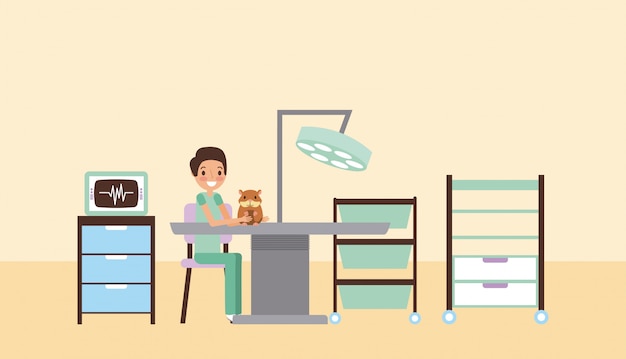Understanding Surgical Services for Pets in Gilbert, IA

Understanding Surgical Services for Pets in Gilbert, IA
When a beloved pet needs surgery, the prospect can be overwhelming for any pet owner. Whether your cat needs a mass removed or your dog requires internal surgery, knowing where to turn and what to expect can make a world of difference. At Companion Animal Clinic, located at 143 Dunn Street, Gilbert, IA 50105, our veterinary professionals are committed to delivering compassionate, expert pet surgical services in Gilbert, IA and surrounding communities. We understand how important it is for you to feel confident in your choice of care, which is why we offer a full spectrum of veterinary surgery in Gilbert, including routine and advanced procedures.
In this guide, you’ll discover the wide range of surgical options our clinic offers, what situations might require surgery for your pet, how we prioritize safety throughout every procedure, and what steps you can take to ensure your dog or cat’s recovery goes as smoothly as possible. If you’re searching for quality veterinary services near me, or if you’re simply wondering what to expect from pet surgical services in Gilbert, IA, you’ll find the answers here. Our commitment is to keep you informed, comfortable, and supported every step of the way. For more details on the specific surgical procedures we offer, you can visit our overview of veterinary surgical services for pets.
Recognizing When Your Pet Might Need Surgical Services
As a pet owner, it’s natural to be concerned when your dog or cat isn’t acting like themselves. Some conditions may develop slowly, while others can arise suddenly and require prompt attention. Recognizing the signs that indicate your pet could benefit from veterinary surgery in Gilbert is the first step to ensuring they receive timely care.
Key symptoms that may suggest the need for surgical intervention include persistent lumps or bumps that change in size or shape, difficulty urinating or defecating, unexplained weight loss, visible wounds that do not heal, or a sudden decline in mobility. Additionally, signs to watch for are ongoing pain or discomfort, unexplained bleeding, frequent vomiting, and changes in behavior such as hiding, decreased appetite, or reluctance to move. In some situations, your pet may have been diagnosed with a condition such as bladder stones or a tumor during a routine checkup, leading your veterinarian to recommend surgery as the best course of action.
Pets can sometimes mask their discomfort, so if you notice subtle changes in their daily habits, it’s always wise to consult a veterinarian near me for an assessment. Our team at Companion Animal Clinic is here to help you determine whether your pet’s symptoms warrant further diagnostics or a surgical procedure.
Understanding the Causes and Conditions That May Require Surgery
Surgery may be recommended for a variety of reasons, from treating acute injuries to addressing chronic health concerns. The most common conditions requiring pet surgical services in Gilbert, IA include masses or growths that could be benign or malignant, internal blockages such as bladder stones, and injuries resulting from accidents or trauma. Other scenarios involve persistent ear infections that do not respond to medical management, torn ligaments, or the need for preventative procedures like spaying and neutering.
In many cases, the underlying cause of your pet’s condition can be complex. For example, masses may develop due to age, genetic predisposition, or environmental factors. Bladder stones may form as a result of dietary imbalances, urinary tract infections, or metabolic disorders. Chronic ear issues may be linked to allergies, breed tendencies, or previous infections. Understanding the root cause helps our veterinary team recommend the most appropriate surgical and post-operative care plan for your pet.
Our approach at Companion Animal Clinic is to use thorough diagnostics, including blood work and imaging, to pinpoint the exact nature of your pet’s problem before proceeding with veterinary surgery in Gilbert. This ensures your pet receives the most effective treatment with the least risk possible. For more details on how we handle internal procedures, explore our information about internal surgical procedures available for pets.
What to Expect from Pet Surgical Services in Gilbert, IA
Choosing the right clinic for your pet’s surgical needs means putting their well-being in expert hands. At Companion Animal Clinic, we provide a full continuum of care, starting with an initial assessment and extending through the entire recovery process. Our surgical services include mass removal, bladder stone removal, internal surgery, ear surgery, cancer surgery, amputations, and routine procedures such as spay and neuter. Each surgery is carefully tailored to your pet’s specific health needs.
The Surgical Process
Before any surgery, your pet will undergo a comprehensive examination and pre-anesthetic testing to assess their overall health and minimize potential risks. This might include blood tests, imaging, or other diagnostics. On the day of surgery, your pet is monitored closely by our veterinary professionals using advanced equipment to ensure safety throughout anesthesia and the procedure itself.
During the surgery, our experienced veterinarians use state-of-the-art techniques and sterile protocols to maximize your pet’s safety. Post-surgical monitoring is a critical phase; we observe your pet as they recover from anesthesia, keeping their comfort and pain management a top priority.
Common procedures we perform, such as mass removals, are recommended when a lump is causing discomfort or poses a health risk. If your pet is diagnosed with bladder stones, our bladder stone removal surgery for pets offers relief from pain and helps prevent future urinary issues. For pets with recurring ear infections or injuries, our ear surgery services for pets can restore comfort and improve quality of life.
Aftercare and Recovery
Recovery times vary depending on the type of surgery and your pet’s overall health. Our team will provide you with detailed post-operative instructions, including pain management, wound care, and activity restrictions. We encourage regular follow-up appointments to monitor your pet’s healing and address any concerns.
If you ever have questions during recovery, our veterinarians are always available to guide you, whether you’re in Gilbert or a surrounding community. We believe that open communication is key to a successful outcome.
Preventive Care and At-Home Support for Pet Surgery Patients
While some surgeries are unavoidable, many conditions can be managed or even prevented through proactive health care and early intervention. Regular checkups, annual wellness exams, and dental care can help catch issues before they become severe enough to require surgical intervention. Keeping your pet at a healthy weight, providing a balanced diet, and ensuring regular exercise can all reduce the risk of certain conditions that might lead to surgery, such as ligament injuries or bladder stones.
At home, steps you can take to reduce surgical risks include monitoring your pet for any new lumps, keeping their living environment clean, and promptly addressing injuries or infections. If your pet is recovering from surgery, create a quiet, comfortable space for rest, limit activity as recommended by your veterinarian, and administer medications exactly as prescribed.
For those seeking spay or neuter surgery, our spay and neuter surgery services for pets not only prevent unwanted litters but also reduce the risk of certain cancers and infections. Preventive care is a partnership between you and our veterinary team, ensuring your pet enjoys a long, healthy life.
When to Seek Professional Veterinary Surgery in Gilbert
Knowing when to seek veterinary care can be the difference between a minor health setback and a serious complication. If your pet is experiencing persistent pain, swelling, bleeding, or sudden changes in appetite or behavior, it’s crucial to schedule an appointment with your veterinarian near me as soon as possible. Additionally, if your pet has been diagnosed with a condition that may require surgery, timely intervention is key to a successful outcome.
Our veterinary team at Companion Animal Clinic offers comprehensive pet surgical services in Gilbert, IA, and we are always available to answer your questions and guide you through your decision-making process. We understand that each pet and situation is unique, so never hesitate to reach out if you are unsure whether your pet’s symptoms warrant a visit.
If you’re concerned about your pet’s recovery or notice anything unusual after surgery, such as redness, swelling, discharge, or loss of appetite, contact us promptly. Early communication helps us address any issues before they become more serious.
Compassionate, Local Surgical Care for Your Pets
Choosing the right provider for pet surgical services in Gilbert, IA means trusting a team that puts your pet’s safety, comfort, and well-being at the forefront. At Companion Animal Clinic, our veterinarians are dedicated to building lasting relationships with every client, offering not just surgical expertise but a compassionate, supportive approach to pet health.
If you have questions about surgery, are seeking veterinary surgery in Gilbert, or want to schedule a consultation, we encourage you to contact our clinic. Our veterinary professionals are always here to help you navigate the decision-making process and provide guidance tailored to your pet’s needs. For more information about our full range of surgical options, visit our overview of veterinary surgical services for pets.
To schedule an appointment, call us at (515) 233-6689 or stop by our convenient location at 143 Dunn Street, Gilbert, IA 50105. If you are searching for a quality vet near me who truly cares about your pet’s health, look no further. Our team looks forward to supporting you and your pet every step of the way.
This blog is intended for informational purposes only and should not be considered a substitute for professional veterinary advice. Always consult your veterinarian for diagnosis and treatment recommendations specific to your pet’s needs.

















